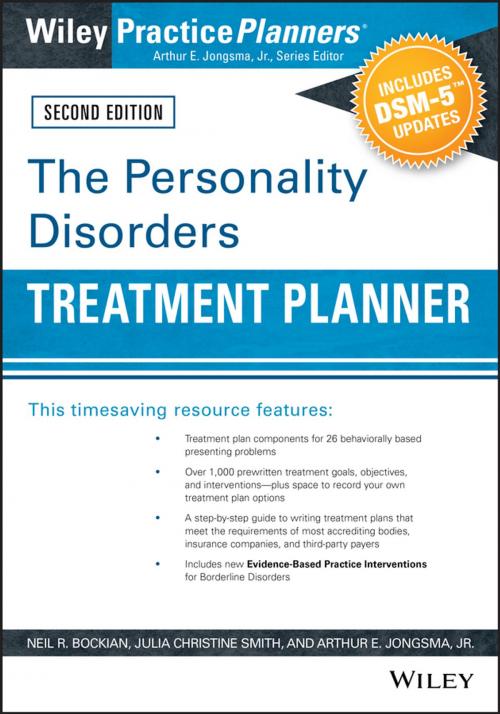The Personality Disorders Treatment Planner: Includes DSM-5 Updates
Nonfiction, Health & Well Being, Psychology, Personality| Author: | Neil R. Bockian, Julia C. Smith, Arthur E. Jongsma Jr. | ISBN: | 9781119101765 |
| Publisher: | Wiley | Publication: | February 4, 2016 |
| Imprint: | Wiley | Language: | English |
| Author: | Neil R. Bockian, Julia C. Smith, Arthur E. Jongsma Jr. |
| ISBN: | 9781119101765 |
| Publisher: | Wiley |
| Publication: | February 4, 2016 |
| Imprint: | Wiley |
| Language: | English |
Approaching personality disorders with evidence-based treatment plans
The Personality Disorders Treatment Planner, 2nd Edition is fully updated to meet the changing needs of the mental healthcare field. A time-saver for psychologists, counselors, social workers, psychiatrists, and other mental health professionals, this new edition offers the tools you need to develop formal treatment plans that meet the demands of HMOs, managed care companies, third-party payors, and state and federal agencies. Organized around twenty-six presenting problems, the easy-to-use format and over 1,000 prewritten symptom descriptions, treatment goals, objectives, and interventions makes the task of developing an evidence-based treatment plan more efficient than ever. The treatment of mental health disorders is rapidly evolving, and new evidence-based protocols are being adopted by federal and state organizations. You are now required to closely monitor patient progress, and you may feel pressure to stick to standardized care and reporting procedures; however, you can only do so if you have access to the latest in evidence-based treatment plans.
- Updated with new and revised evidence-based Objectives and Interventions
- Integrated DSM-5 diagnostic labels and ICD-10 codes into the Diagnostic Suggestions section of each chapter
- Many more suggested homework assignments integrated into the Interventions
- An Appendix demonstrates the use of the personality disorders Proposed Dimensional System of DSM-5.
- Expanded and updated self-help book list in the Bibliotherapy Appendix
- Revised, expanded and updated Professional Reference Appendix
- New Recovery Model Appendix D listing Objectives and Interventions allowing the integration of a recovery model orientation into treatment plans
Approaching personality disorders with evidence-based treatment plans
The Personality Disorders Treatment Planner, 2nd Edition is fully updated to meet the changing needs of the mental healthcare field. A time-saver for psychologists, counselors, social workers, psychiatrists, and other mental health professionals, this new edition offers the tools you need to develop formal treatment plans that meet the demands of HMOs, managed care companies, third-party payors, and state and federal agencies. Organized around twenty-six presenting problems, the easy-to-use format and over 1,000 prewritten symptom descriptions, treatment goals, objectives, and interventions makes the task of developing an evidence-based treatment plan more efficient than ever. The treatment of mental health disorders is rapidly evolving, and new evidence-based protocols are being adopted by federal and state organizations. You are now required to closely monitor patient progress, and you may feel pressure to stick to standardized care and reporting procedures; however, you can only do so if you have access to the latest in evidence-based treatment plans.
- Updated with new and revised evidence-based Objectives and Interventions
- Integrated DSM-5 diagnostic labels and ICD-10 codes into the Diagnostic Suggestions section of each chapter
- Many more suggested homework assignments integrated into the Interventions
- An Appendix demonstrates the use of the personality disorders Proposed Dimensional System of DSM-5.
- Expanded and updated self-help book list in the Bibliotherapy Appendix
- Revised, expanded and updated Professional Reference Appendix
- New Recovery Model Appendix D listing Objectives and Interventions allowing the integration of a recovery model orientation into treatment plans















